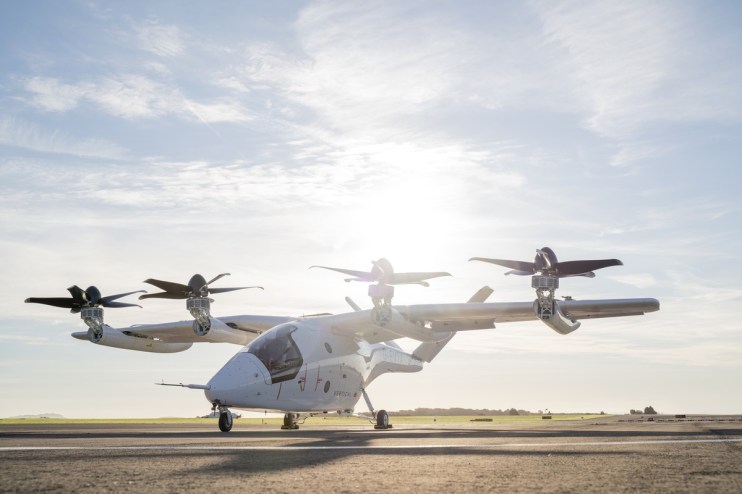Vertical Aerospace: Battersea to Heathrow in 10 minutes?

Nothing fills the traveller with more dread than the early morning rush to the airport.
Weary-eyed and with a foreboding sense of anxiety as the clock ticks down to take off, it stakes its claim as the worst part of any trip abroad.
Now, imagine a future where a trip from Central London to Heathrow took little more than 10 minutes.
That’s the goal of Stuart Simpson, the former Avast CFO and automotive executive tasked with heading up Vertical Aerospace, one of only a handful of firms pioneering the development of flying taxis in the world’s major cities.
“I followed the company for a couple of years before I joined and this really went for me, from an is this going to work, to a when is it going to work… That’s why I joined,” he says, chatting in the firm’s London offices.

Those who scoff at the idea may end up eating their words.
Investment in developing so-called eVTOLs has ramped up across Europe, the US and China, and it is now seen as one part of the solution to sustainable travel.
On Thursday, Toyota announced plans to invest half a billion and raise its stake in Joby Aviation, a US-based air taxi start-up aiming to launch commercial services as soon as next year.
Other big players include Silicon Valley-based Archer Aviation, China’s Ehang and the French planemaking giant Airbus.
Vertical Aerospace history
Founded in 2016 by the Northern Irish billionaire Stephen Fitzpatrick, Bristol-based Vertical Aerospace became the fourth eVTOL company to go public when it listed on the New York Stock Exchange in 2021, raising $300m (£229.5m) in the process.
It is developing an aircraft called the VX4, a battery-powered eVTOL that could have a range of 100 miles and reach speeds of up to 150mph.
The VX4 will, according to the company, be able to whisk passengers from Battersea to Heathrow in 12 minutes, with deliveries set to start in 2027.
But eight years after Vertical Aerospace’s inception, a myriad of barriers have prevented a smooth takeoff.
Last year, an unmanned experimental test flight of a VX4 prototype ended with a crash at Gloucestershire’s Cotswold Airport.
Vertical has since launched legal action against Prodrive Composites, the supplier of vehicle components, and has had to grapple with the reputational and financial fallout.
One of its earliest shareholders, the engineering giant Rolls-Royce, dropped out of the business earlier in 2023.
The setback is one of many challenges faced by the industry. Vertical is seeking regulatory approval from the UK Civil Aviation Authority (CAA), which has higher safety standards than its US and Chinese counterparts.
This is both a blessing and a curse, but Simpson admits that a target certification date of the end of 2026 will be “challenging.”
“We have an official date out in the market for the end of 2026. That’s our official date, and it’s challenging… but at the minute, that’s the target date, and we can get there,” he insists.
Alongside regulatory hurdles, the sector is also dealing with its fair share of financial uncertainty.
Several start-ups have been forced to tap investors for more funding over the last year, while others have struggled to build vital infrastructure needed for the future roll-out.
Vertical Aerospace burned through cash and reported an operating loss of £20m in the first half of 2024.
The pressure is on to turn around a torrid share price performance since its IPO, with the stock falling 43 per cent in just the last 12 months and nigh on 100 per cent following its market debut.
Boardroom spat?
The financial challenges appeared to peak last month when it was revealed that the firm’s Northern Irish backer and former CEO, Fitzpatrick, who is best known for founding Ovo Energy, had skipped paying $25m (£19m) of a planned $50m (£38m) equity injection announced in January.
Reports suggest an ongoing spat between the board and Fitzpatrick, who has sought greater control over the company’s leadership and whose investment is necessary for it to continue as a going concern.
Simpson, though, plays down the tensions. “There’s nothing Macchiavellian, nothing untoward, this is really just correcting some of the stuff we didn’t quite do right at the time of the initial float.
“Steve is a massive supporter of the business, I talk to him pretty much everyday… he is 100 per cent committed.”
Concerning the funding tranche, he adds: “The business is absolutely a going concern. This is really just a case of timing and negotiating with Steve when he comes in, he owns 70 per cent plus of it, he’s not going to let this fail, it’s just a case of when the money comes in.”
Financial and regulatory hurdles give flying taxi sceptics easy ammunition for criticism, but they are perhaps mostly indicative of the growing pains of any nascent technology.
Analysts at Raymond James and Canaccord Genuity have backed Vertical despite the losses in its most recent financial report.
Growing order book
Simpson is also keen to stress a booming forward order book worth around $6bn (£4.6bn) despite none of his aircraft ever taking off.
Customers span four continents and include Virgin Atlantic, American Airlines, and Japan Airlines, with Vertical currently seeking certification in five global markets.
While government support in the UK has been lacking, it has previously outlined an aim of bringing flying taxis and emergency service drones into routine use by the end of the decade, signalling the tech’s potential significance in the green transition.
The boss of Vertical Aerospace is bullish on its potential importance for the UK economy and the wider aerospace sector.
“This is all about time, if you think the staggering amount of waste that people have when they’re stuck in traffic jams and can’t get around, this literally unleashes a huge amount of productivity.”
The company also employs over 300 people, most based in Bristol, a city famed for its aviation and aerospace heritage.
“You can attract amazing global talent here… from UK universities, Bristol included, and you’ve got the infrastructure around you, the supply chain to help you develop.”
“It sets us apart from our competition. The real credible ones are based in Silicon Valley and it is way more expensive there. Their cash burn is three, four, five times what ours is, because we pay a lot less, but our progress is broadly equivalent.”
Simpson won’t be drawn in on a possible dual listing in the UK.
“To do a dual listing puts a big drag and additional cost,” he explains. “I think once we get further down the line, we could look at it. In fact, we have talked about it many times, but now is not the time.”
Much higher on Simpson’s to-do list will be sorting out the share price.
Based on the last few years, this task has been undeniably difficult, but there are positive signals; only time will tell.